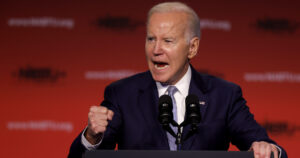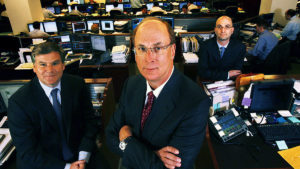A year into the Biden Administration, the asset management group BlackRock appeared to recognise what other financial institutions had missed: the shift to a “new investment order”. Covid-era fiscal stimulus, wrote a panel of the firm’s executives, was here to stay. Yet the corresponding increase in government indebtedness did not concern BlackRock: rising inflation, in its view, would “likely have more benign market implications than in the past”. Joe Biden’s $1.9 trillion stimulus bill, the American Rescue Plan, was strung together within his first 100 days in office by Brian Deese, BlackRock’s former head of environmental, social and governance (ESG) investing. BlackRock itself quickly expressed support for these initiatives — even breaking with business lobbies in backing increased taxation on business.
To some Democrats and progressives, this represented the formation of a “liberal financial bloc”, the heralding of the post-neoliberal era, and the possibility of an awkward coalition between the titans of American finance and the Left. Some posed the question: Had the financial sector’s partisanship shifted Leftward?
Yet, in the past year, the bet that finance could constitute a governing partner in a post-neoliberal society has rapidly soured. Nearly every hedge fund manager, many of whom loudly advocated ESG investing, has endorsed Donald Trump. And despite all of BlackRock’s initial support for the Biden administration’s post-neoliberal agenda — and the political capital invested in legislating the “liberal financial bloc” — the firm’s CEO, Larry Fink, harbours aspirations of holding the job of treasury secretary under a prospective Trump Administration.
Not so long ago, observers noted the close ties between BlackRock and the White House: former BlackRock executives — particularly Deese, who led the powerful Council of Economic Advisors — occupied numerous leading roles within Biden and Kamala Harris’s staff. BlackRock’s involvement in crafting what Deese described as a “21st-century American industrial strategy” signalled a genuine break with the neoliberal economics of the past several decades.
Deese proposed mild social democratic policies — expanded state subsidies for education, high-speed internet access, healthcare, and childcare — that led some to speculate that finance capital would not only support the subsidisation of infrastructure for corporate competitiveness, but may even constitute a “liberal financial bloc” that could serve as the foundation for a new social democratic class compromise. In this sense, “Bidenomics” seemed to answer post-neoliberal social democrats’ call for a renewal of industrial strategy to support corporate competitiveness and technological development, which, it was assumed, would go some way toward recreating the “good jobs” of the golden age. Biden’s post-neoliberal agenda and the distinct interests of finance capital seemed aligned.
To many progressives, even if the investments Biden proposed were oriented toward maximising corporate competitiveness and fostering public-private partnerships, such stimulus would be good for workers in that it could tighten labour markets and, therefore, create an opportunity to bargain for higher wages. So, too, would this put on the agenda the question of what form state spending would take, suggesting at least some expansion of social spending. As a result, these arguments held, the new finance capital opened the possibility for a renewed social democratic class compromise either around the environment or the expansion of the welfare state and income redistribution.
Such speculation was supported by the fact that finance capital was closely identified with the proliferation of “green” investment vehicles, especially in the form of ESG funds. Though a vocal opponent of ESG, even Blackstone CEO, Steve Schwarzman, accepted the necessity of a government-led transition to a “green world”. The CEOs of Citigroup, Bank of America and Wells Fargo each pledged to net zero carbon emissions by 2050 — the same goal outlined by the now infamous Green New Deal House resolution. This seemed to confirm further that the financial sector could finally be a partner in decarbonising the economy.
What accounted for asset managers’ newfound progressivism? The political economist Benjamin Braun suggested this new sensibility reflected shifting incentives at the heart of financialised capitalism. Asset managers — as “universal owners” supposedly holding interests that transcend the profit motive of any single enterprise — could be expected to take new stances on sustainability and government spending, provided those matters relate to the long-term health of capitalism. Increased government spending, for example, was imperative during Covid. Moreover, these firms could constitute a “powerful ‘easy money’ constituency” — in the sense that they supposedly fear asset devaluation, which would result from a restrictive monetary policy, more than inflation. Asset managers had never held such a commanding position within the capitalist economy during a significant inflationary surge, ostensibly opening the possibility for a break from the low-inflation monetary regime that persisted throughout the neoliberal period.
If Bidenomics represented an attempt to strike a post-neoliberal class compromise, then, its political economy rested upon the participation — begrudging though it might have been — of the new finance capital. But, as the Democrats are now discovering, finance is a fickle coalition partner.
Fiscal expansion may tighten labour markets and thus create an opportunity for workers to bargain for increased wages, but, to the extent that this results in price increases, the entire strategy is undermined. Not only did Larry Fink explicitly support increasing interest rates, but he even challenged Federal Reserve chair Jerome Powell’s initial assessment that inflation was merely transitory, while insisting previously that the Fed would have to change policy. The support of finance capital for “easy money” evaporates the moment the working class begins to mobilise, or inflation exceeds certain limits.
Bidenomics, in turn, fundamentally hangs upon low rates, which made possible a re-evaluation of the cost of massive government debt, opening new horizons for a would-be activist government. Though far from triggering a crisis in US bond markets, this created a political doom loop for “big fiscal”: higher rates force up the cost of debt service, in turn eroding the political feasibility of major deficit spending. JP Morgan CEO Jamie Dimon and Larry Fink, both of whom supported ambitious fiscal stimulus four years ago, have since become highly critical of Biden’s deficit spending.
In this sense, the symbiosis between the financial sector and the Democratic Party depends upon low inflation, and thus low rates. Meanwhile, in the context of higher rates, BlackRock will likely turn even more intensively to pushing its portfolio firms to ruthlessly cut costs, eliminate redundancies, outsource overseas, and find profits — undercutting the Biden administration’s efforts to rein in globalisation and support labour organising. Dimon, once an outspoken supporter of ESG, industrial policy, state-led investment in energy (going as far as to call for a “Marshall Plan” on energy security), and higher marginal tax rates, has since muted his political advocacy and cosied up to Trump. Schwarzman has followed suit.
Similarly, BlackRock’s much-vaunted emphasis on ESG investing has already been very publicly reined in. While ESG was always primarily about marketing, a 2022 BlackRock memo explained that the firm would endorse fewer shareholder proposals on environmental responsibility over the coming year than it did in the prior one, because, in the firm’s words, these are now too “constraining” and “prescriptive”. JP Morgan, likewise, warned of the need for a “reality check” on phasing out fossil fuels earlier this year: investment in renewable energy, per the firm, “currently offers subpar returns”. The hedge fund manager Bill Ackman dedicated a large portion of his 2020 annual letter to Pershing Square shareholders to his commitment to ESG investing: he has since blamed inflation upon ESG, while becoming among Donald Trump’s most vocal backers in finance. And BlackRock’s initial openness to tax increases to correct current grotesque levels of inequality has very real limits: the growth model of asset management firms relies on inequality, and the resulting availability of surplus savings, to grow their assets under management.
It was always unclear how the moderate expansion of social programmes Biden proposed — such as universal pre-kindergarten, affordable childcare, free community college, strengthened unemployment insurance, and enlarged Obamacare — could fit with the interests of finance capital. Indeed, many of these policies were axed from what eventually became the Inflation Reduction Act. And, as we have seen, the macroeconomic environment these policies played a role in creating was almost instantly recognised by the titans of American finance as antagonistic to their interests. Though the Bidenites themselves (many of whom were adjacent to Wall Street) imagined their debt-funded enlargement of the welfare state to be in the interests of American finance, the undoing of the sector’s support for the Democratic party and its economic priorities by way of ESG investing should decisively shatter this fiction.
The decisive question facing a prospective Harris administration is to what extent it will recognise the increasingly divergent interests of the Democratic Party and its partners in finance. Organised labour, in today’s Midwestern political geography, may very well be more powerful than either party. In Ohio, for instance, the Republicans’ symbiotic relationship with organised labour has excised power from the Democrats within the state legislature, and all but eliminated its competitiveness on the national level. Meanwhile, in Michigan, unions hardened by the 2012 passage of “right-to-work” legislation revitalised a dilapidated centre-left project, polarising state politics around labour rights while winning control at all levels of state politics. For Democrats — and increasingly Republicans — the path to Midwestern political power runs through organised labour. And with the financial sector skittish about the macroeconomic consequences of strengthened unions, the Democrats must make a choice: whether to continue seeking class compromise with finance or backing labour, and, with it, a chance of growing power in the Rust Belt.
But, in a broader sense, this suggests the fundamental mistakes of Biden’s project. The financial sector simply never represented a “liberal financial bloc” beyond the immediate economic imperatives of corona-crash crisis fighting. The notion served the practical purpose of evading a broader reckoning with corporate power within the Democratic Party, and, in effect, shielded Democrats from properly reckoning with the political challenges of sustaining “big fiscal”.
If the Democrats wish to lead a truly post-neoliberal political project, it will not be through attempting to reconcile working-class interests with the financial sector. Instead, the Democrats will need to take on the financial sector on matters of antitrust, globalisation, fiscal policy, and housing. Indeed, the party’s current focus upon corporate competitiveness represents a massive retreat from traditional social democratic demands for decommodified public services, not to mention public ownership of industry, born of decades of defeat and accommodation. The choice facing the Democratic Party, then, stands as an encapsulation of what is missing in American politics, and of what may yet be reclaimed.
Disclaimer
Some of the posts we share are controversial and we do not necessarily agree with them in the whole extend. Sometimes we agree with the content or part of it but we do not agree with the narration or language. Nevertheless we find them somehow interesting, valuable and/or informative or we share them, because we strongly believe in freedom of speech, free press and journalism. We strongly encourage you to have a critical approach to all the content, do your own research and analysis to build your own opinion.
We would be glad to have your feedback.
Source: UnHerd Read the original article here: https://unherd.com/



